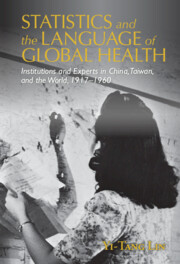Statistics and the Language of Global Health
Yi-Tang Lin presents the historical process by which statistics became the language of global health for local and international health organizations. Drawing on archival material from three continents, this study investigates efforts by public health schools, philanthropic foundations, and international organizations to turn numbers into an international language for public health. Lin shows how these initiatives produced an international network of public health experts who, across various socioeconomic and political contexts, opted for different strategies when it came to setting global standards and translating local realities into numbers. Focusing on China and Taiwan between 1917 and 1960, Lin examines the reception, adaptation, and appropriation of international health statistics. She presents the dynamic interplay between numbers, experts, and policy-making in international health organizations and administrations in China and Taiwan. This title is also available as Open Access on Cambridge Core.
Yi-Tang Lin is a Swiss National Science Foundation postdoctoral fellow at the University of Geneva and a visiting scholar at the Harvard Fairbank Center for Chinese Studies for 2021–22.



